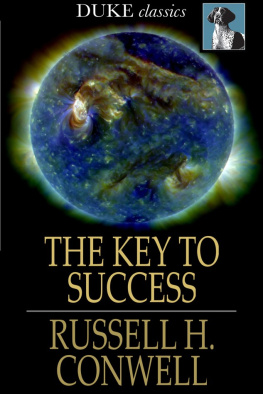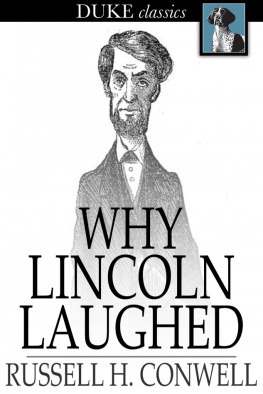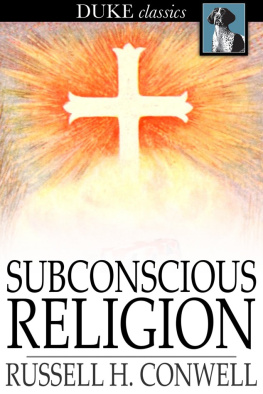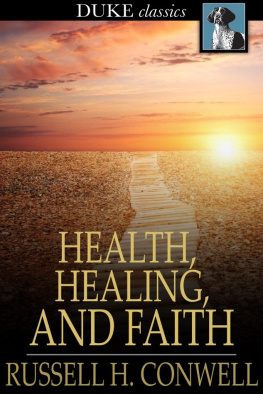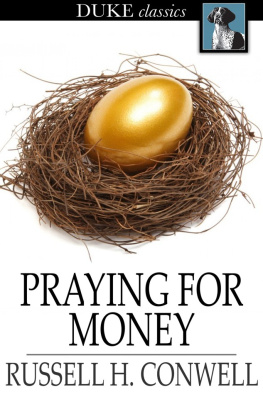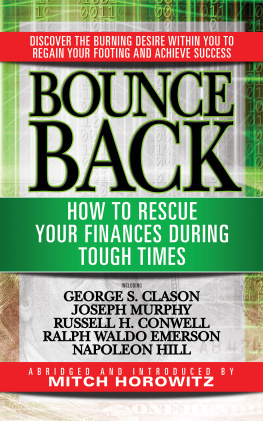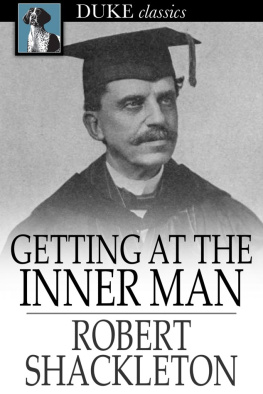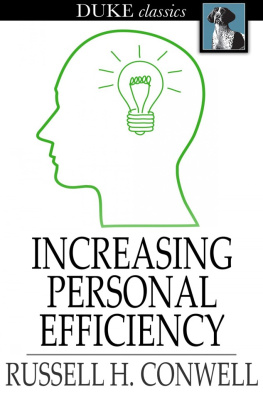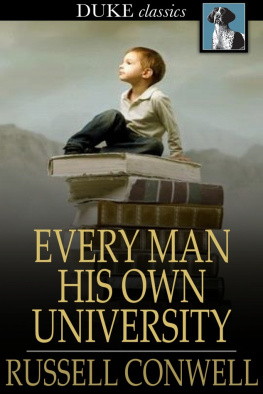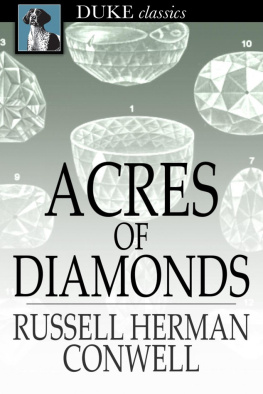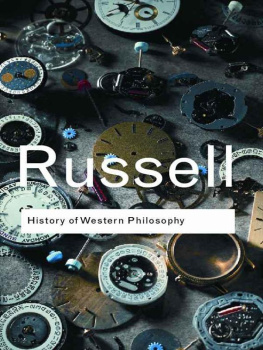Russell H. Conwell - The Key to Success
Here you can read online Russell H. Conwell - The Key to Success full text of the book (entire story) in english for free. Download pdf and epub, get meaning, cover and reviews about this ebook. year: 2012, publisher: Duke Classics, genre: Art. Description of the work, (preface) as well as reviews are available. Best literature library LitArk.com created for fans of good reading and offers a wide selection of genres:
Romance novel
Science fiction
Adventure
Detective
Science
History
Home and family
Prose
Art
Politics
Computer
Non-fiction
Religion
Business
Children
Humor
Choose a favorite category and find really read worthwhile books. Enjoy immersion in the world of imagination, feel the emotions of the characters or learn something new for yourself, make an fascinating discovery.
- Book:The Key to Success
- Author:
- Publisher:Duke Classics
- Genre:
- Year:2012
- Rating:3 / 5
- Favourites:Add to favourites
- Your mark:
- 60
- 1
- 2
- 3
- 4
- 5
The Key to Success: summary, description and annotation
We offer to read an annotation, description, summary or preface (depends on what the author of the book "The Key to Success" wrote himself). If you haven't found the necessary information about the book — write in the comments, we will try to find it.
Self-made man and renowned Baptist minister Russell Conwell helped to usher in a paradigm shift in Christian thinking in the late nineteenth and early twentieth centuriesand also managed to help remake the self-help genre in the process. The Key to Success is a comprehensive overview of Conwells philosophy, and its chock-full of ideas that will help you make your wildest dreams of success come true.
The Key to Success — read online for free the complete book (whole text) full work
Below is the text of the book, divided by pages. System saving the place of the last page read, allows you to conveniently read the book "The Key to Success" online for free, without having to search again every time where you left off. Put a bookmark, and you can go to the page where you finished reading at any time.
Font size:
Interval:
Bookmark:

First published in 1917
ISBN 978-1-62011-763-7
Duke Classics
2012 Duke Classics and its licensors. All rights reserved.
While every effort has been used to ensure the accuracy and reliability of the information contained in this edition, Duke Classics does not assume liability or responsibility for any errors or omissions in this book. Duke Classics does not accept responsibility for loss suffered as a result of reliance upon the accuracy or currency of information contained in this book.
People are thinking, but they can think much more. The housewife isthinking about the chemical changes caused by heat in meats, vegetables,and liquids. The sailor thinks about the gold in sea-water, the soldierthinks of smokeless powder and muffled guns; the puddler meditates oniron squeezers and electric furnaces; the farmer admires LutherBurbank's magical combinations in plant life; the school-girl examinesthe composition of her pencil and analyses the writing-paper; theteacher studies psychology at first hand; the preacher understands moreof the life that now is; the merchant and manufacturer give moreattention to the demand. Yes, we are all thinking. But we are stillthinking too far away; even the prism through which we see the stars isnear the eyes. The dentist is thinking too much about other people'steeth.
This book is sent out to induce people to look at their own eyes, topick up the gold in their laps, to study anatomy under the tutorship oftheir own hearts. One could accumulate great wisdom and secure fortunesby studying his own finger-nails. This lesson seems the very easiest tolearn, and for that reason is the most difficult.
The lecture, "The Silver Crown," which the author has been giving invarious forms for fifty years, is herein printed from a stenographicreport of one address on this general subject. It will not be found alltogether, as a lecture, for this book is an attempt to give furthersuggestion on the many different ways in which the subject has beentreated, just as the lecture has varied in its illustrations from timeto time. The lecture was addressed to the ear. This truth, whichamplifies the lecture, is addressed to the eye.
I have been greatly assisted, and sometimes superseded, in thepreparation of these pages by Prof. James F. Willis, of Philadelphia.Bless him!
My hope is by this means to reach a larger audience even than that whichhas heard some of the things herein so many times in the last forty-fiveyears. We do not hope to give or sell anything to the reader. He hasenough already. But many starve with bread in their mouths. They spit itout and weep for food. Humans are a strange collection. But they can beinduced to think much more accurately and far more efficiently. Thisbook is sent out as an aid to closer observation and more efficientliving.
RUSSELL H. CONWELL.
September 1917.
An autobiography! What an absurd request! If all the conditions werefavorable, the story of my public life could not be made interesting. Itdoes not seem possible that any will care to read so plain anduneventful a tale.
I was a young man, not yet of age, when I delivered my first platformlecture. The Civil War of 1861-65 drew on with all its passions,patriotism, horrors, and fears, and I was studying law at YaleUniversity. I had from childhood felt that I was "called to theministry." The earliest event of memory is the prayer of my father atfamily prayers in the little old cottage in the Hampshire highlands ofthe Berkshire Hills, calling on God with a sobbing voice to lead me intosome special service for the Saviour. It filled me with awe, dread, andfear, and I recoiled from the thought, until I determined to fightagainst it with all my power. So I sought for other professions and fordecent excuses for being anything but a preacher.
Yet while I was nervous and timid before the class in declamation anddreaded to face any kind of an audience, I felt in my soul a strangeimpulsion toward public speaking which for years made me miserable. Thewar and the public meetings for recruiting soldiers furnished an outletfor my suppressed sense of duty, and my first lecture was on the"Lessons of History."
That matchless temperance orator and loving friend, John B. Gough,introduced me to the little audience in Westfield, Massachusetts, in1862. What a foolish little school-boy speech it must have been! But Mr.Gough's kind words of praise, the bouquets, and the applause, made mefeel that somehow the way to public oratory would not be so hard as Ihad feared.
From that time I acted on Mr. Gough's advice and "sought practice" byaccepting almost every invitation I received to speak on any kind of asubject.
While I was gaining practice in the first years of platform work, I hadthe good fortune to have profitable employment as a soldier, or as acorrespondent or lawyer, or as an editor, or as a preacher, whichenabled me to pay my own expenses, and it has been seldom in the fiftyyears that I have ever taken a fee for my personal use. In the lastthirty-six years I have dedicated solemnly all the lecture income tobenevolent enterprises. If I am antiquated enough for an autobiography,perhaps I may be aged enough to avoid the criticism of being an egotistwhen I state that some years I delivered one lecture, "Acres ofDiamonds," over two hundred times each year, at an average income ofabout one hundred and fifty dollars for each lecture.
Often have I been asked if I did not, in fifty years of travel in allsorts of conveyances, meet with accidents. It is a marvel to me that nosuch event ever brought me harm. In a continuous period of overtwenty-seven years I delivered about two lectures in every three days,yet I did not miss a single engagement. Sometimes I had to hire aspecial train, but I reached the town on time, with only a rareexception, and then I was but a few minutes late. Accidents havepreceded and followed me on trains and boats, and were sometimes insight, but I was preserved without injury through all the years. In theJohnstown flood region I saw a bridge go out behind our train. I wasonce on a derelict steamer on the Atlantic for twenty-six days. Atanother time a man was killed in the berth of a sleeper I had left halfan hour before. Often have I felt the train leave the track, but no onewas killed.
Yet this period of lecturing has been, after all, a side issue. TheTemple, and its church, in Philadelphia, which, when its membership wasless than three thousand members, for so many years contributed throughits membership over sixty thousand dollars a year for the uplift ofhumanity, have made life a continual surprise; while the SamaritanHospital's amazing growth, and the Garretson Hospital's dispensaries,have been so continually ministering to the sick and poor, and have donesuch skilful work for the tens of thousands who ask for their help eachyear, that I have been happy while away lecturing by the feeling thateach hour and minute they were faithfully doing good.
Temple University, which was founded only twenty-seven years ago, hasalready sent out into a higher income and nobler life nearly a hundredthousand young men and women who could not probably have obtained aneducation in any other institution. The faithful, self-sacrificingfaculty, now numbering two hundred and fifty-three professors, have donethe real work. For that I can claim but little credit; and I mentionthe university here only to show that my "fifty years on the lectureplatform" has necessarily been a side line of work.
Font size:
Interval:
Bookmark:
Similar books «The Key to Success»
Look at similar books to The Key to Success. We have selected literature similar in name and meaning in the hope of providing readers with more options to find new, interesting, not yet read works.
Discussion, reviews of the book The Key to Success and just readers' own opinions. Leave your comments, write what you think about the work, its meaning or the main characters. Specify what exactly you liked and what you didn't like, and why you think so.

